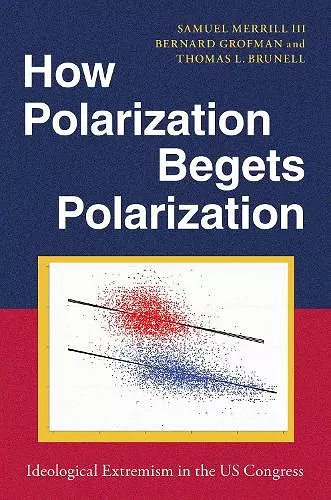How Polarization Begets Polarization
Ideological Extremism in the US Congress
Samuel Merrill, III author Bernard Grofman author Thomas L Brunell author
Format:Hardback
Publisher:Oxford University Press Inc
Published:29th Feb '24
£64.00
Supplier delay - available to order, but may take longer than usual.
This hardback is available in another edition too:
- Paperback£19.99(9780197745236)

This book explores the intertwined nature of polarization in Congress and among voters, highlighting how strict party discipline and activist influence deepen divisions, raising questions about potential paths to resolution.
In How Polarization Begets Polarization, the author explores the deepening divide in American politics, particularly within the U.S. Congress. This polarization is portrayed as a complex and troubling phenomenon that affects not only lawmakers but also the electorate. The book presents a compelling argument that the polarization seen in Congress is intricately linked to the growing divisions among voters, creating a continuous feedback loop. This dynamic is fueled by the strict discipline that political parties impose on their members, compelling them to align closely with party ideologies and cater to their respective bases.
The author highlights how the choices presented to voters in Congressional districts have become increasingly extreme, regardless of whether the districts are competitive or heavily skewed toward one party. As party loyalty intensifies, the ideological gap between the two major parties widens, resulting in Congressional delegations that are not only distinct from one another but also narrowly focused in their beliefs. This situation is exacerbated by the influence of activists who push for more extreme positions, further motivating parties to prioritize their core supporters over moderate voters.
As the book delves into potential resolutions for this polarization, it raises thought-provoking questions about the future of American politics. Could a new reform movement emerge to challenge the current divisive climate, similar to how the progressive movement transformed the political landscape in the past? Alternatively, might a shift in partisan dynamics allow for a resurgence of centrist policies? The author leaves readers contemplating the possibilities for change in a deeply polarized political environment, suggesting that only time will reveal the path forward.
Among the leading students of the increasing polarization of American politics, the authors of this important new book lay out a novel institutional perspective on the interaction between polarization in Congress and competition at the district level. * Robert D. Putnam, Research Professor, Harvard Kennedy School and co-author of The Upswing: How America Came Together a Century Ago and How We Can Do It Again. *
Merrill, Grofman, and Brunell have provided the most sophisticated analysis yet of how polarization results from competing demands on candidates to be moderate in order to appeal to the preferences of most voters vs. appealing to their own base for the sake of mobilizing extremists and their moneyed supporters. Their analysis reveals when these competing demands result in convergence to moderate positions, and when they lead to self-reinforcing polarization. * Robert Axelrod, William D. Hamilton Distinguished University Professor, Emeritus *
The literature on legislative polarization identifies numerous contributors, among them party sorting among voters, the influence of party activists, internal legislative organization, and the level of party parity. This book's contribution consists of integrating these disparate forces into a single dynamic model that generates the unhappy implication: polarization begets polarization. * Morris P. Fiorina, Wendt Family Professor of Political Science and Senior Fellow of the Hoover Institution *
Merrill, Grofman, and Brunell's deft theoretical and empirical examination of the complex links between congressional politics and district-level electoral competition delivers a coherent and persuasive account of how institutional processes have sustained and amplified partisan polarization. It is a major contribution to understanding this corrosive feature of present-day American politics. * Gary Jacobson, Distinguished Professor of Political Science, Emeritus *
What's causing US politics to polarize? For a quick answer, blame the other party's appalling behavior! But for the best answer, read Merrill, Grofman, and Brunell's fascinating and sophisticated account of the hidden processes causing these disturbing patterns in American politics. * Gary King, Weatherhead University Professor, and Director of the Institute for Quantitative Political Science, Harvard University *
This is an ambitious book that tackles the ever-present question of why American politics has polarized-and continues to polarize today. The authors demonstrate how electoral and partisan incentives can propel partisans-from lawmakers to candidates and activists-to champion policies that increasingly diverge from the political center. An essential contribution to scholarship and debates about polarization and how it might one day be tamed. * Sarah Binder, George Washington University and The Brookings Institution *
The authors' presentation is sometimes challenging, but the resulting analysis makes this relatively short book very valuable for understanding American political polarization. Recommended. * Choice *
ISBN: 9780197745229
Dimensions: 156mm x 235mm x 15mm
Weight: 413g
194 pages